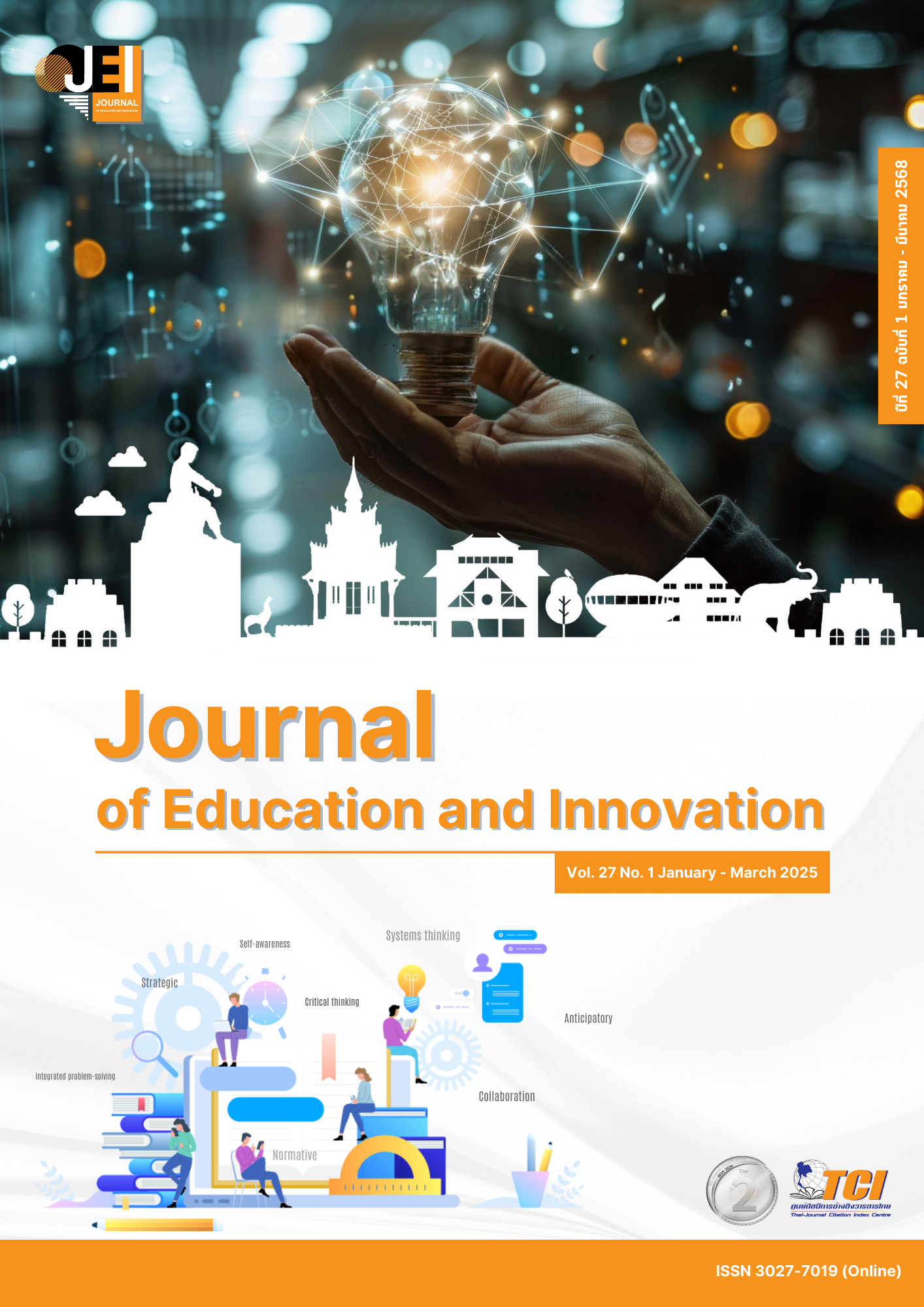FACILITATIVE SUPERVISOR: THE TRANSITION POINT OF SUPERVISOR DEVELOPMENT TO ACHIEVE PROFESSIONAL STANDARDS
Main Article Content
Abstract
This article aims to present the importance of supervisors as educational personnel who play an important role in driving education to achieve the goals of the national education plan. Presents the current concerns of supervisors that arise from teachers’ misunderstanding of the roles and responsibilities of supervisors, resulting in miscommunication problems between teachers and supervisors which are obstacles to reach teachers’ teaching management problems because it impossible to solve problems that arise directly. And also present the concept of developing the characteristics of supervisors that will help supervisors perform their duties to achieve professional standards by using various skills. To enable supervisors to access problems of teachers’ teaching management and lead to problem solving in the role of “facilitative supervisor”. Facilitative supervisor should have 6 skills are 1) Positive atmosphere creation skills, 2) Questioning skills, 3) Listening skills, 4) Powerful communication skills, 5) Exchange of thoughts and ideas skills, and 6) Reflective skills. The development of these skills will lead to the facilitator characteristics of new supervisors that will relate to and encourage the performance of duties according to the role of supervisors to achieve the supervisor professional standards.
Article Details

This work is licensed under a Creative Commons Attribution-NonCommercial-NoDerivatives 4.0 International License.
The owner of the article does not copy or violate any of its copyright. If any copyright infringement occurs or prosecution, in any case, the Editorial Board is not involved in all the rights to the owner of the article to be performed.
References
Aiman, E., Naree, K., & Uppinjai, S. (2022). Modern educational supervisors: Adapting to challenges in a changing world. Journal Of Educational Administration and Leadership, 10(39), 1-8.
Bravo, C. (2019). Assessing and Enhancing the Skills of Interprofessional Practice Facilitators: Clinical and Educational Applications (Doctoral dissertation). Rutgers the State University of New Jersey, Rutgers School of Health Professions.
Hanmethee, P., & Wilaiwan, J. (2019). The Facilitator: Professional "Fa" handbook. Bangkok: Kla Kao.
Inthajak, J., Yavirat, P., & Tunkaew, T. (2016). Expectation of Teachers and School Administrators towards the Operation and Characteristics of Supervisors of the Secondary Educational Service Area Office 36. Graduate School Journal, 9(20), 49-64.
Jarusombat, T. (2019). On the path to becoming a coach for change. Nakhon Pathom: Phu Sai Daeng.
Kamchan, P., Udomrat, T., Boonying, W., & Sriphan, A. (2023). Future scenario of educational supervision for supervisors under the Primary Educational Service Area Office in the next decade: A case of technology content (computing science). Academic Research Journal, 6(5), 59-74.
Khaisaeng, T. (2022). The development of a training curriculum to enhance the ability in Thai language learning management based on the language transfer theory for teachers teaching ethnic minority students (Doctoral dissertation). Phitsanulok: Naresuan University.
Khotsiri, C., Payakkul, D., & Kruekham-ai, W. (2021). The educational supervision competencies of supervisors in the 21st century under Chiang Mai Primary Educational Service Area Office 1-6. Journal of the Association for the Development of Educational Administration Professionals of Thailand, 3(2), 21-28.
Khumklang, M., Sawatthaisong, N., & Singpan, P. (2022). Academic Leadership in the 21st Century of Supervisor in Secondary Education Service Area Office Ubonratchathani Amnatcharoen. Journal of MCU Ubon Review, 7(3), 1273-1290.
National Institute of Educational Testing Service (Public Organization). (2023). O-NET Score Reporting System.
Retrieved from https://www.niets.or.th/th/catalog/view/3385
Office of the Teacher Civil Service and Educational Personnel Commission. (2022). Announcement of the Teacher Civil Service and Educational Personnel Commission on Criteria and Methods for Selecting Individuals for Appointment to Educational Supervisor Positions under the Ministry of Education. Announced on January 5, 2022. Bangkok: Office of the Teacher Civil Service and Educational Personnel Commission.
Panich, V. (2019). Learning for transformation. Bangkok: Siam Commercial Foundation.
Payakkul, D., Khotsiri, C., & Kruekhamai, W. (2021). The 21st century supervisors in educational supervision competencies under the Chiang Mai Primary Education Service Area Office 1-6. Journal of Association of Professional Development of Educational Administration of Thailand, 3(4), 16-24.
Premsuk, S. (2018). Developing leadership skills for professional learning community facilitators of department heads in Sri Wichian School Group, Secondary Educational Service Area Office 40 (Independent study). Phitsanulok: Naresuan University.
Schwarz, R. M. (2002). The skilled facilitator: Practical wisdom for developing effective groups. Jossey-Bass.
Sri-ittayajit, S. (2012). Development of performance competency indicators for educational supervisors in the measurement and evaluation department under the Primary Educational Service Area Office: Analysis of empirical validity, sensitivity, and specificity (Doctoral dissertation). Chonburi: Burapha University.
Tanphan, S., & Khositphimanwet, E. (2022). Educational supervision. Maneechettaram Wat Chom Mani Journal, 5(2), 100-114.


